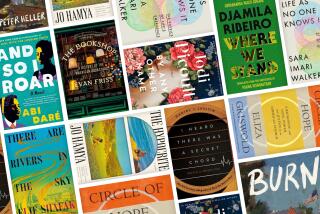Book review: ‘The Good Muslim’ by Tahmima Anam
The Good Muslim
A Novel
Tahmima Anam
Harper: 297 pp., $25.99
Maya Haque is one of the century’s most interesting characters: prickly, passionate, tender, selfless, headstrong, devoted, belligerent, idealistic, naive, wise. “The Good Muslim” is Maya’s story, rooted in her devotion to nation and family and particularly to her brother, the tormented Sohail Haque.
What is it about Bengali anthropologists? First we have feted novelist Amitav Ghosh from West Bengal and now Tahmima Anam from East Bengal. Both earned doctorates in anthropology before turning to literary fiction. Each draws distinctly from a multi-ethnic Bengali culture that has spawned epic independence movements (from the 1857 mutiny against the British to the 1971 Bangladesh Liberation War) as well as innovative artists (including Rabindranath Tagore, Satyajit Ray and Tareque Masud).
Anam sets her second novel in Bangladesh during the 1970s and 1980s, depicting the different ways Maya and Sohail survive the war and the ensuing Mujib dictatorship. Finishing her work in refugee camps, Maya is the first to return to Dhaka in 1972. She and her mother, Rehana, have a long wait for Sohail, who finally reappears, a silent wraith wracked by the revolutionary violence in which he was both victim and perpetrator. Slowly, surprisingly, he surfaces from traumatized muteness to become a charismatic preacher.
“The Good Muslim” brims with gripping narrative, absorbing history and Shakespearean moral conundrums. Anam’s characterizations are complex and immediate; her settings are both fresh and archetypal. “It was a winter of return, mothers waiting at home, preparing elaborate meals with the leftover war rations, straining their eyes to the road, jumping at the slightest sound. Inevitably, the moment of homecoming did not happen in the way they imagined.… No, it usually happened when she was at the market for a leg of mutton or looking for the lost pair of clothes pegs in the grass, and the boy would appear, disheveled and with new depths in his eyes, new sorrows etched into him, and when she saw him it would be like birthing him all over again, checking he had all his fingers and toes, wondering if he would survive this new world.”
Bangladesh’s struggle for independence from Pakistan divides the previously inseparable siblings after 18 years of shared secrets, sorrows, adventures and dreams. But the wake of war distances them still further, as Sohail seeks refuge in conservative Islam and Maya practices her activism as a doctor and journalist. “Your brother is turning, she told herself, turning. Soon you won’t recognize him. He had been her oldest friend, all the things a brother should be: protective, bullying, pushing her to be better. He knew all her frailties; knew she tended toward the hysterical, the dogmatic. That she was angry most of the time. He pushed her against herself.” Caught in the middle are their steadfast mother Rehana and Sohail’s troubled son Zaid.
The stunned Maya watches her freedom fighter brother relinquishing their mutual political and cultural pursuits. “She thought of all the things he liked to do.… Cricket on the shortwave. Mangoes and ice cream. Dante and Ibsen. Jimi Hendrix and John Lennon. Her voice on the harmonium. Her voice.”
Maya’s ardent efforts to rescue Sohail are finally what provoke him to burn all his books and what, in turn, drives her to leave the family for seven more years and work in rural women’s healthcare. When she returns in 1984, she finds that Sohail has plunged deeper into holiness and further from earthly responsibilities for his son and mother. Once again her attempts at restoration result in unimaginable damage.
Anam asks how the wounds of war shape us, all of us. She troubles the arbitrary distinctions of warrior, victim and bystander; she protests a discourse in which the pain of women raped by enemy soldiers is expunged by the mantle of “war heroine.”
“The Good Muslim” is a timely drama about the unpredictable effects of religious zealotry and political violence as well as a keen examination of survival and forgiveness.
Miner teaches at Stanford University and her latest novel is “After Eden.”
More to Read
Sign up for our Book Club newsletter
Get the latest news, events and more from the Los Angeles Times Book Club, and help us get L.A. reading and talking.
You may occasionally receive promotional content from the Los Angeles Times.









